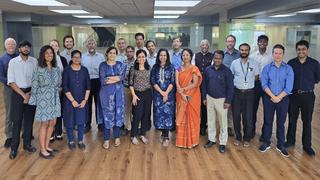
The group of experts from India and America have identified pressing challenges faced by individuals living with diabetes and their caregivers to develop tech solutions
| Photo Credit: Special Arrangement
The Indian Institute of Technology Madras has partnered with American institutions to improve diabetes care in India. The collaborators also aim to identify and solve high priority problems in non-communicable diseases.
The institute has partnered with Emory University’s Emory Global Diabetes Research Centre (EGDRC), and the Institute for People and Technology (IPaT) at Georgia Institute of Technology to develop technological solutions for diabetics.
Need for improved diabetes care in India
It is believed that an estimated 200 million people in India could be at high risk or have diabetes. The collaboration would help since people living with diabetes need a diverse range of technological solutions to manage their condition, says researcher Anubama Rajan, co-head of Shankar Centre of Excellence in Diabetes Research (SCoEDR), under the Department of Medical Science and Technology at IIT Madras. The centre’s project is called StopNCD.org. The centre was established through funding by an alumnus, V. Shankar said Ms. Rajan, who is also an assistant professor in the department.
“Clearly defining the problems faced by patients, their caregivers and doctors is among the most crucial steps in developing technological solutions,” she explained.

Identifying treatment gaps
Among the medical professionals involved in the project are V. Mohan, diabetologist and founder of Mohan Diabetes Research Foundation; Anjana Mohan, managing director of Mohan Diabetes Specialties Centre; Jaya Prakash Sahoo, professor and head, Department of Endocrinology, JIPMER, Puducherry; Nikhil Tandon, professor and head of the Department of Endocrinology and Metabolism, AIIMS, Delhi; professors from the Department of Endocrinology, Diabetes and Metabolism, CMC, Vellore including Felix Jebasingh K, Vignesh Kumar C, and Nihal Thomas; Rajiv Raman, who leads the diabetic retinopathy project group in Sankara Nethralaya; and Roopa Shivashankar, scientist at the Indian Council of Medical Research, from India are involved in the project.
The group of experts from India and America have identified 10 most pressing challenges faced by individuals living with diabetes and their caregivers to develop tech solutions. The details can be found in https://www.stopncd.org/top-10-problems/india.
Jithin Sam Varghese, codirector of EGDRC Diabetes Translational Accelerator and member of the expert group said fostering early partnerships would enable to accelerate development of impactful solutions.
“We work extensively with Emory, which is a major global leader in diabetes research. One of the first steps was to organise a workshop with leading endocrinologists to identify the major problems. We wanted to define 10 problems for this year and next year that can be easily solved using technology,” Ms. Rajan said.
Identifying the problems will open avenues for engineers and researchers at the IIT Madras to develop products, she added.

Clinical challenges and possible tech solutions
“Each of the experts spoke about the problems they faced in their daily clinical experience. Dr. Rajiv said by the time the patient came for a consult the macula had already degenerated. An app which can take photos of retina’s self-image could prevent diabetes by 50% to 60%, Ms. Rajan said.
There were such inputs from endocrinologists, nephrologists and about foot care. The lower middle class that gets treated continue to ignore the after-care post procedures. Experts suggested that such people could be given the option of elevated footwear. The present footwear is bulky but there are lighter materials that could be explored.
“One of the goals for Emory and IIT M is to develop technological solutions. Our students will partner with Emory and Georgia Tech to codrive some of these solutions,” Ms. Rajan said.
“We wanted to work on the project, but we wanted others in the world also to work on it,” she added.
Published – May 15, 2025 08:09 pm IST













Leave a Reply